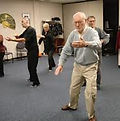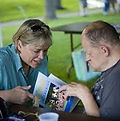The Older Americans Act (OAA) seeks to enable all older individuals to maintain their well-being through locally developed community-based systems of services. The OAA Title IIIB Supportive Services Program provides a variety of services to address functional limitations, health and independence maintenance and promotion of service access.
The Title IIIB Supportive Services Program enables older adults to access services that address functional limitations, promote socialization, maintain health and independence, and protect elder rights. Together, these services promote older adults' ability to maintain the highest possible levels of function, participation and dignity in the community.
Title IIIB Services include: Chore, Homemaker, Transportation, Assisted Transportation, Counseling, Legal Assistance, and Telephone Reassurance.
Title IIIC (1 & 2)

The Congregate Nutrition Program (Title IIIC-1) addresses dietary inadequacy and social isolation among individuals aged 60 and older. The Program provides nutrition education, nutrition risk screening and, in some Planning and Service Areas, nutrition counseling. The program targets older individuals with the greatest economic or social need, with particular attention given to low-income minority older individuals and older individuals living in rural areas. The program encourages the use of volunteers and gives all participants the opportunity to contribute to the meal cost.
The Home-Delivered Nutrition Program (Title IIIC-2) provides nutritious meals, nutrition education, and nutrition risk screening to individuals 60 years of age or over who are homebound by reason of illness or disability, or who are otherwise isolated. Program goals are targeted to the reduction of social isolation and the promotion of better health through nutrition. Most home-delivered meal programs provide their clients with a hot meal five days a week delivered by staff or volunteer drivers. In addition, nutrition education is provided and nutrition counseling may be available.
Title IIID
Disease Prevention & Health Promotion Services

The Disease Prevention and Health Promotion Services Program (Title III D) provides disease prevention services or health promotion programs. Title III D supports programs that assist older adults with preventing illness and managing chronic physical conditions. Although illness and disability rates increase with age, research has demonstrated that health promotion and disease prevention activities can help promote healthy and independent lives for older individuals.
Disease Prevention and Health Promotion Services promote healthy aging and the maintenance of optimal physical, mental, and social well-being in older adults. An active healthy lifestyle can help older adults prolong their independence and improve their quality of life.
The Aging Network has been moving toward using evidence-based disease prevention and health promotion programs over the past few years. The Fiscal Year (FY) 2012 Congressional appropriations now require that OAA Title IIID funding be used only for program and activities which have been demonstrated to be evidence-based.
Title IIIE
Caregiver Support & Counseling

The National Family Caregiver Support Program (NFCSP), established in 2000, provides grants to States and Territories, based on their share of the population aged 70 and over, to fund a range of supports that assist family and informal caregivers to care for their loved ones at home for as long as possible.
Families are the major provider of long-term care, but research has shown that caregiving exacts a heavy emotional, physical and financial toll. Many caregivers who work and provide care experience conflicts between these responsibilities. Twenty two percent of caregivers are assisting two individuals, while eight percent are caring for three or more. Almost half of all caregivers are over age 50, making them more vulnerable to a decline in their own health, and one-third describe their own health as fair to poor.
Click here to see our Title IIIE Providers

